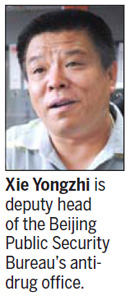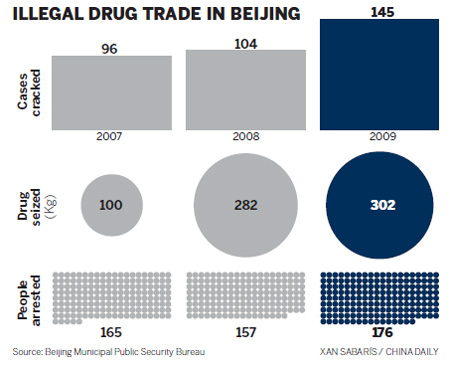Beijing captures 581 foreign drug suspects since '07
The trafficking of drugs into the capital is "still rampant" despite the detention of 581 foreign smugglers since an anti-trafficking campaign was launched in 2007, a senior anti-narcotics official told China Daily.
 |
The detained foreigners, from 28 countries and regions, were responsible for trafficking 682 kilograms of drugs in 200 cases, Xie Yongzhi, deputy head of the Beijing Public Security Bureau's anti-drug office, said. Most of the foreign traffickers were from Africa and South Asia, Xie added.
In 2007, Beijing police initiated the "Road, Air and Mail" campaign to highlight just how drugs could be transported.
While foreign suspects were caught in 200 cases, 389 foreign-related cases concerning 738 kilograms of drugs have been uncovered in Beijing - including heroin, methamphetamine (also known as "ice"), and marijuana.
Airports, railway stations, highways and mail systems were the main means of drug transportation and the amount of drugs seized in these modes of transport accounted for 70 percent of the total drug haul in the city, Xie said.
"Drug trafficking is still rampant, driven by huge profit and market demands and the situation is not something we should be optimistic about in Beijing."
The three main international drug trafficking centers, Xie said, are: The "Golden Triangle" in Southeast Asia which encompasses parts of Thailand, Laos and Cambodia, the "Golden Crescent" that includes parts of Afghanistan, Iran and Pakistan, and finally South America.
Domestically, the drugs come mainly from southeastern costal areas, where most of the nation's methamphetamine is produced. Chongqing and Sichuan are also sources for K-powder, commonly known as "ecstasy".

Smugglers have tried various means to bring in narcotics, including swallowing them, Xie said.
"We have body X-ray detectors as well as X-ray machines for detecting drugs hidden in bags and luggage, and a testing box which can confirm the presence of drugs," he said.
On July 5, Beijing police seized 600 grams of heroin from a Pakistan suspect as he was going through customs after landing at Beijing Capital International Airport.
Abdul Rauf, 37, was wearing an ill-fitting white suit, carried a small black bag and did not have a customs declaration.
When he was passing through customs, he told police he was a businessman but on examination the police found that he had very little cash or means to get money such as bank cards.
The police asked him to have a body X-ray which revealed a shadow in his stomach. He was found to have 600 grams of heroin inside his stomach.
In June, Beijing police seized 2.5 kilograms of heroin hidden between the layers of three books from Sobol Semen Vlodimirovich, a 25-year-old Kyrgyzstan male suspect.
Nationwide, 91,000 drug suspects were detained last year involving 77,000 cases, with 28.8 tons of drugs seized, Xinhua News Agency reported early.
 0
0 






